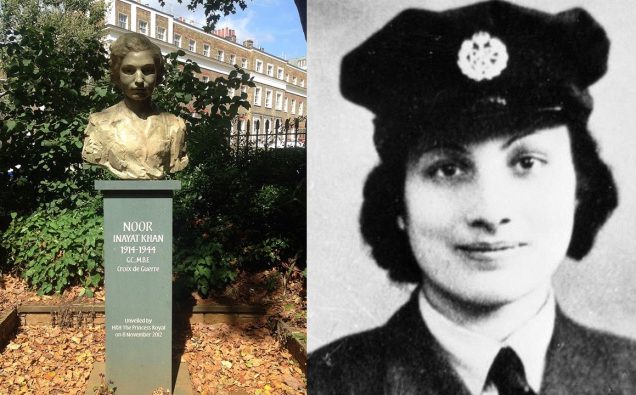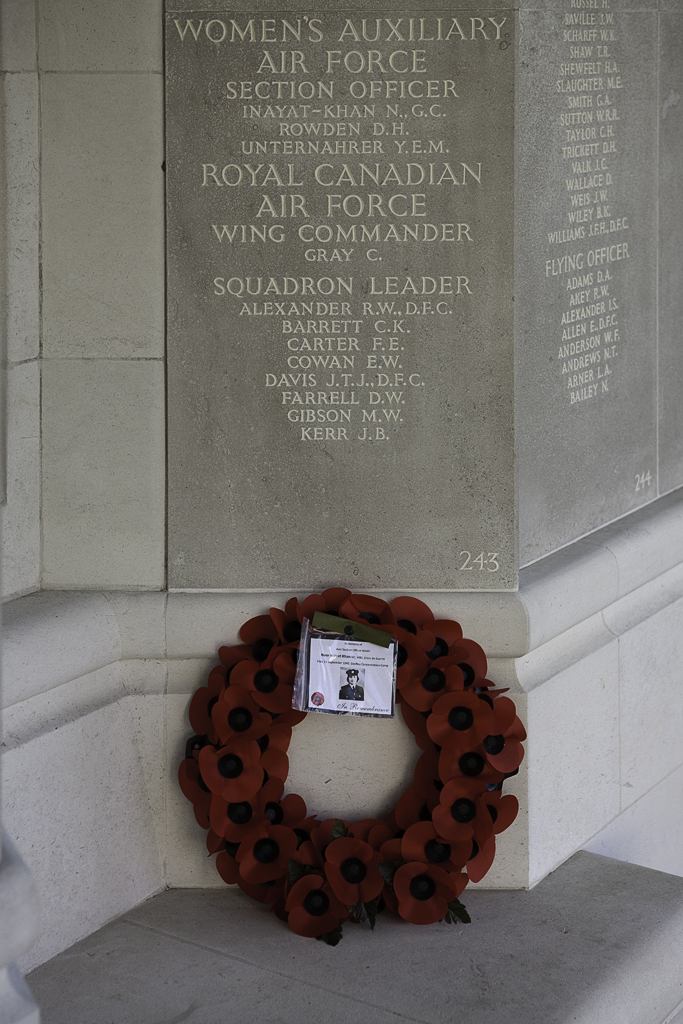
“Liberte” was the last word she uttered, as she paid the ultimate price in the line of duty.
She was a woman of extraordinary qualities – courage, integrity, and a sublime sense of purposefulness in life – and she persevered with a combination of all three traits in the midst of one of the worst catastrophes, humanity has gone through.
She was a great-great-great-granddaughter of Tipu Sultan, the late 18th-century ruler of Mysore, whose own strength of character and epic fight against the invading British imperialist forces are a fabled chapter in the history of the Indian sub-continent.
The time was the height of WWII in 1943-44, the battlefield was Nazi-occupied France and the heroic figure was Princess Noor-un-Nisa Inayat Khan, who as Britain’s Special Operations Executive agent, worked for the cause of Europe’s emancipation.

Tipu Sultan, ruler of Mysore in India/Wikipedia
Even upon her arrest, following a French woman’s betrayal, she unflinchingly clung to her qualities of integrity and adhered to the ideals of liberty.
Persisting with true grit and grace, she defied Gestapo’s brutal interrogation tactics but revealed none of the British secret operation details during her months-long confinement.
Her incarceration ended in Germany where she was shot dead. She was just 30 years old, and was posthumously awarded the highest British civil award George Cross, appointed a Member of the Order of the British Empire and Mentioned in Despatches, and awarded a French Croix de Guerre with Gold Star
Noor-un-Nisa belonged to a high-profile family, which symbolized a unique East-West union.
In their book, Conn Iggulden and David Iggulden noted how Noor, a supporter of Indian independence, desired an Indian would perform outstandingly and win recognition in the war to serve as a bridge between the British and the Indians.
“Of the thirty-six thousand Indians, who died in World War II, that Indian was to be (Noor) Khan herself,” they observed.
Her father Hazrat Inayat Khan was a great-grandson of Tipu Sultan and lived in Europe as a musician and a teacher of Sufism. Her mother, Ora Meena Ray Baker, was an American from Albuquerque, New Mexico who met Inayat Khan during his travels in the United States. The family lived in France and London.
Ora Baker was the half-sister of American yogi and scholar Pierre Bernard, her guardian at the time she met Hazrat Inayat Khan.
Shortly before the outbreak of the First World War in 1914, the family left Russia for London and lived in Bloomsbury. Noor attended nursery at Notting Hill.

B MK II receiver and transmitter (also known as the B2 radio set) Image: Hanedoes / Wikimedia
In 1920, they moved to France, settling in Suresnes near Paris, in a house that was a gift from a benefactor of the Sufi movement.
Her father’s death in 1927 brought an added, poignant dimension to her life as Noor, the eldest of four children, took care of her grief-stricken mother and her younger siblings.
She studied child psychology at the Sorbonne and music at the Paris Conservatory under the famous Nadia Boulanger, composing for harp and piano. She also learned to play the veena, an Indian stringed instrument.
She started writing poetry and children’s stories and became a regular contributor to children’s magazines and French radio.
The family moved from Paris to Falmouth, Cornwell, England, in the wake of the German blitz, invasion, and occupation of France.
In Britain, Noor’s brother Vilayat joined the Royal Air Force and she joined the Women’s Auxiliary Air Force. Afterward, she was recruited by Special Operations Executive as a wireless operator. After necessary training, she was flown to northern France in the summer of 1943. From there, she would make it to Paris.
In Paris, she lived perilously for Nazis followed her closely but she evaded them and at one time Noor was one of the very few credible conduits of messaging between Britain and French resistance.
But her heroic work was cut short when a Frenchwoman betrayed Noor to Gestapo in October. The Gestapo personnel subjected her to the worst forms of torture but failed to glean anything from their rock-determined captive. She even twice tried to escape from their custody.

Inayat Khan’s inscription at the Air Forces Memorial at Runnymede, England memorializing those without a known grave Image: WyrdLight.com, / Wikimedia
Declaring her a dangerous prisoner, Gestapo sent her to the German prison of Pforzheim, and then to the infamous Dachau concentration camp, where she along with other agents was shot in the back of the head in September. She was beaten savagely by the Nazis before being shot.
Noor’s life and sacrifice in the way of liberty make her a towering Muslim hero in the modern world as well as provide a glimpse into the nobility of the human spirit. The war, on the darker side, represents the cruelty of humans to their fellow beings.
Her life and sacrifice also offer all elements of drama – suspense, action, heroic commitment to liberty, betrayal, war, and misery of a people under occupation that a good production can turn into a successful film.
“Our world needs Muslim heroes,” says Dr. Maqsood Chaudhry, who several years ago hosted a banquet to benefit Unity Productions Foundation, an educational media organization that produced a film on the life of the illustrious young woman Noor-un-Nisa.
The story included a network of Muslims, Jews, and Christians that sheltered Allied airmen shot down over France; the Paris Mosque, which saved numerous POWs and Jewish refugees; and the amazing heroism of a young Muslim woman of mixed Indian and American descent, who for a time was the only link between the Allied cause and the French Resistance.













